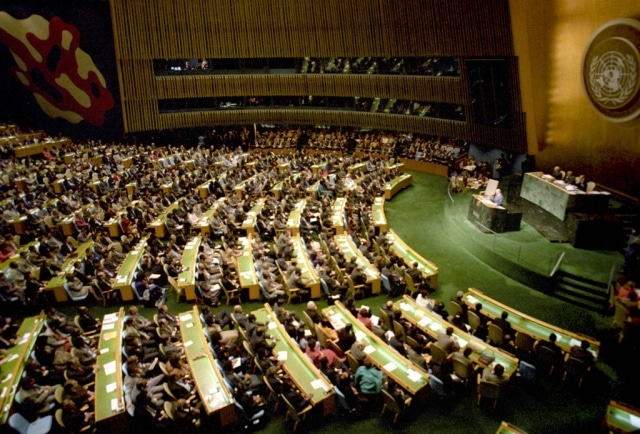Once heralded as a clear turning point, government participation at the Rio Earth Summit’s would soon be seen as more symbolic than effective. The DeSmog UK epic history series continues.
The Rio Earth Summit in July 1992 was celebrated by environmentalists as the clearest sign that the world’s leaders would support limits to carbon emissions and literally save the world from the imminent catastrophe of climate change.
George Bush Snr, the Republican president, oil millionaire and former CIA director, signed the UN Framework Convention on Climate Change that summer with the promise that he would ensure the document would become “concrete action to protect the planet”.
Party Gatecrasher
The Convention was signed by a total 156 countries and only needed ratification by 50 to come into force. The event was marked with a special ceremony. However, the late IPCC founding chairman, Bert Bolin, detected that the IPCC was seen as a “threat” and a gatecrasher at its own party.
“Not until the celebrations were in full swing did the [Intergovernmental Negotiating Committee] INC Chairman, Jean Ripert, informally call me to the podium to join the others who were congratulating each other,” Bolin recalled.
According to Rupert Darwall, author of The Age of Global Warming: A History, Bush Snr noticeably spent “as little time at Rio as he decently could.”
Darwall adds: “He gave a speech, signed the climate change convention, and had his photo taken with the one hundred and seven other world leaders at the summit.”
But history would soon expose the tragic reality of the conference. The “convention’s teeth had been pulled with the removal of legally bindings targets.” Darwall writes.
The convention and the participation of the president was symbolic more than it was effective. It would be the first of the regular major jamborees rather than a decisive turning point.
Dire Warnings
Nonetheless, this did not stop the sceptics making dire warnings about the threat it posed to democracy. Fred Smith of the Exxon funded Competitive Enterprise Institute (CEI) was flown out to Rio by the Free Congress Committee and given press credentials to observe the delegates.
Dixy Lee Ray, perhaps the most vociferous anti-environmentalist author of her day, also went along for the ride. She characterised Agenda 21, as signed at Rio, as imposing “world government under the UN, [so] that essentially all governments give up their sovereignty, and that nations will be, as they said quite openly, frightened or coerced into doing that by threats of environmental damage”.
Ray detected at the conference an undue influence by socialists and transferred the terror of communism after the fall of the Soviet Union into the fear of environmentalism. She claimed: “The International Socialist Party, which is intent upon continuing to press countries into socialism, is now headed up by people within the United Nations.
“They are the ones in the UN environmental program, and they were the ones sponsoring the so-called Earth Summit that was attended by 178 nations.”
Green Scare
As the academics Peter Jaques and Riley Dunlop observed, the Red Scare switched automatically to the Green Scare.
Later, Smith was able to use his experience of Rio to convince his friends within the network of free market think tanks that a major threat lay just over the horizon.
As Political Science professor at Virginia Tech and author of A Rough Road Out of Rio, Timothy Luke, would write: “The 1992 ‘Earth Summit’ in Rio, in particular, marked an important turning point. The US conservative movement began to see global environmentalism as a threat to US national sovereignty and economic power, and became aggressively anti-environmental.”
Even the American president was particularly susceptible to the scepticism within the Republican party as Bush Snr sought the endorsement of his party to stand for a second time as president.
And in the beginning, the business lobby group Global Climate Coalition – formed in 1989 in response to IPCC findings – would lead the charge. It would prove one of the most outspoken and confrontational industry groups in the US fighting against attempts to reduce greenhouse gas emissions before it closed-up shop in 2002.
Next week: DeSmog UK’s epic history series recounts the moment when John Blundell was recruited into Antony Fisher’s free-market think tank, the Institute of Economic Affairs.
Photo: RIA Novosti via Wikimedia Commons
Subscribe to our newsletter
Stay up to date with DeSmog news and alerts







